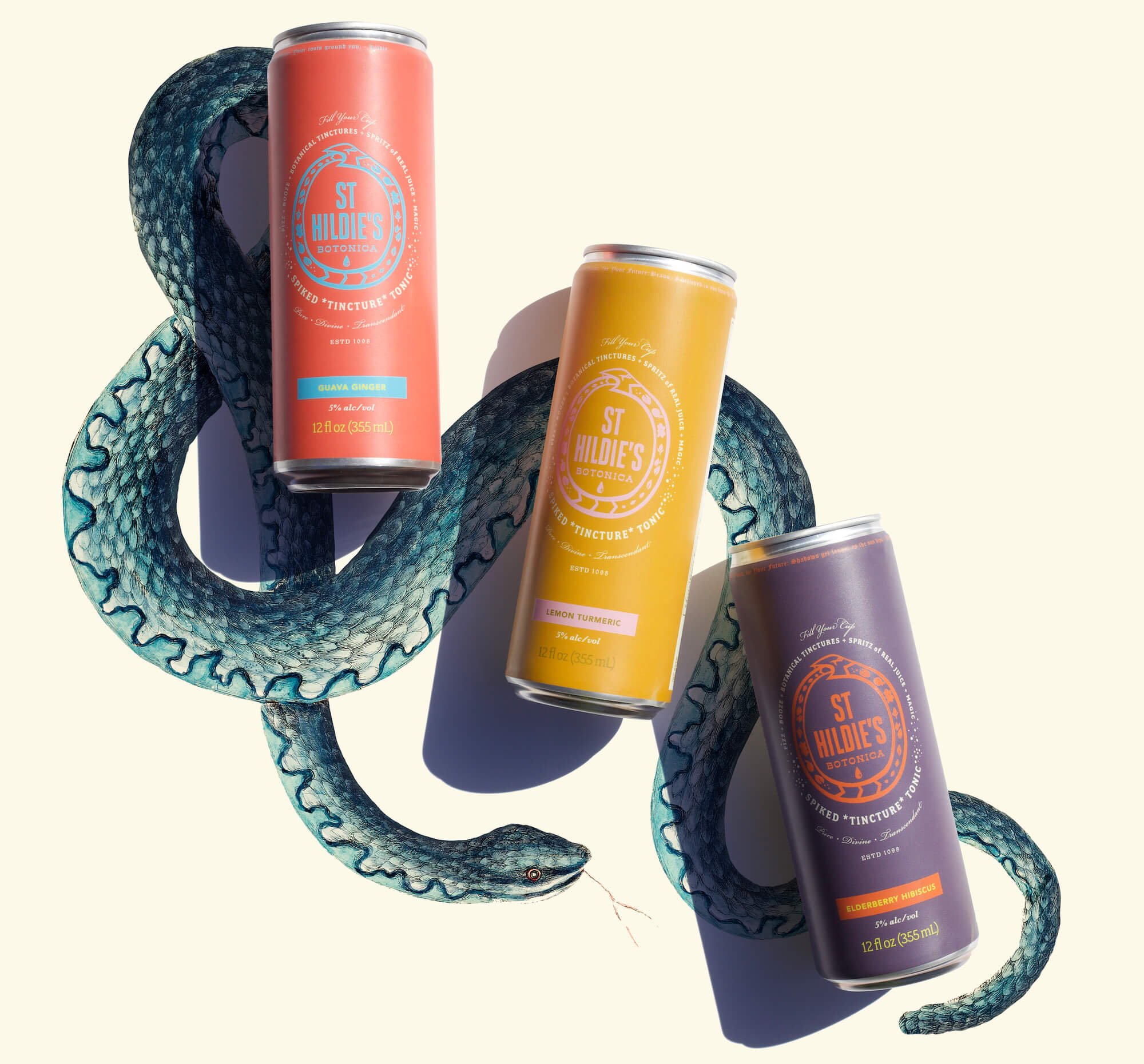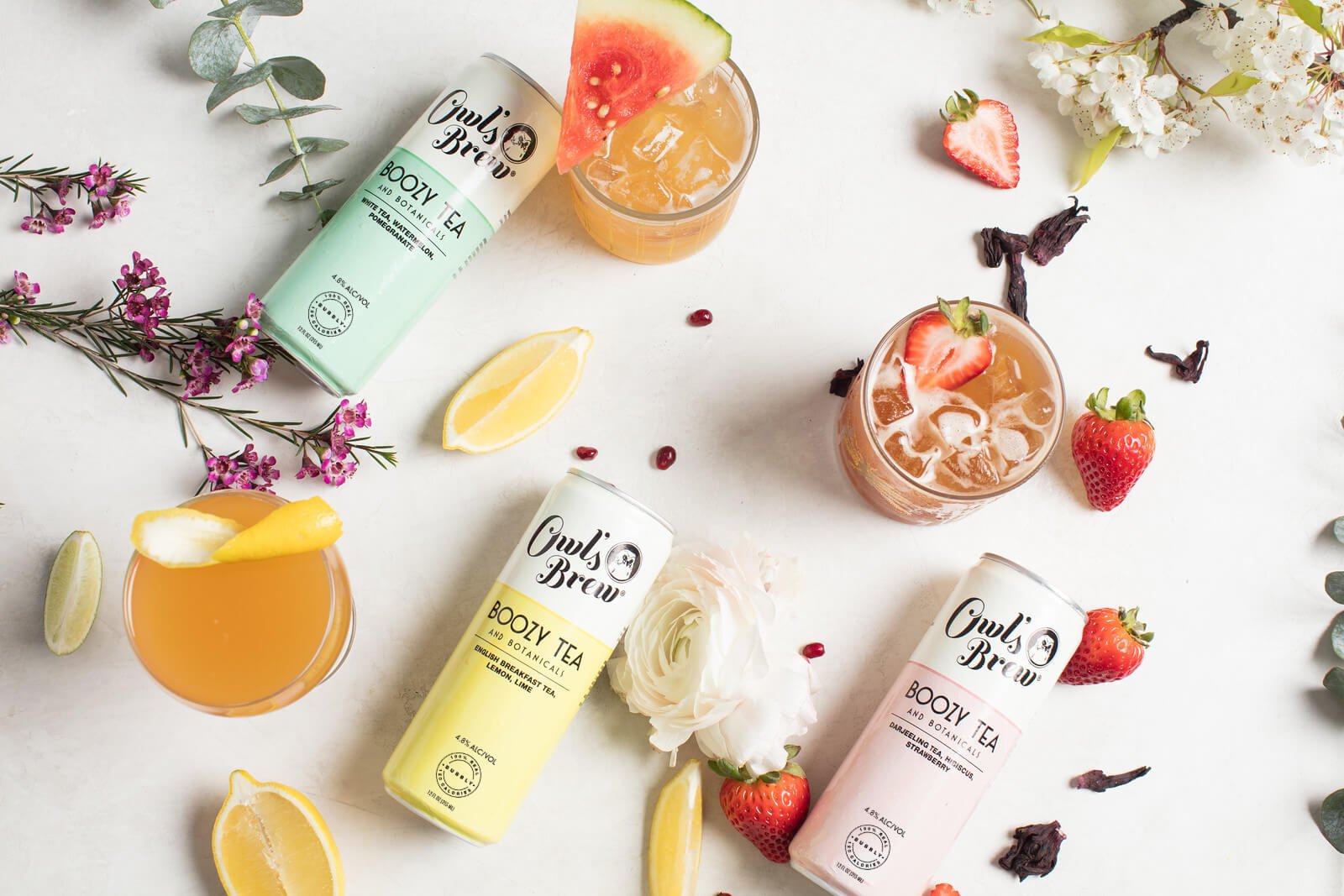Are Adaptogens and Healthful Botanicals the Next Big Trend in Cocktails?
Editor’s note: Recently the Alcohol and Tobacco Tax and Trade Bureau (TTB) clarified the use of the word “clean” in alcoholic beverages saying the term has no TTB definition and “consumers should not interpret the term as meaning that the beverage is organic or has met other production standards set by TTB.” Can the use of the word “better” be far behind? Only time will tell if producers will keep using these vague terms, but there is no doubt they will continue to find new ways to imply that alcoholic beverages have healthful benefits.
It was bound to happen. After the wave of energy drinks, now the pendulum swings to cocktail brands promising to help you chill and manage stress. Alcohol as stress management technique isn’t anything new, as anyone at the bar during happy hour can tell you. But often using terms like “clean” and “better” brands like Pulp Culture, St. Hildie’s, Owl’s Brew, and Hello Gorgeous aren’t just low alcohol, they pack adaptogens.
Adaptogens
When it comes to defining adaptogens, “We don’t have a simple answer,” says Dr. Rashmi Mullur, Associate Clinical Professor at UCLA’s David Geffen School of Medicine. “It’s a broad category of plant or herbal products that help the body adapt to stressors.”
A fancy term with a vague definition, adaptogens are basically age-old medicinal plants and herbs. They have long been integrated into Traditional Chinese Medicine and Ayurvedic practices. Used in therapeutic treatment, ginseng has been found to provide energy support, ashwaganda can help manage stress, rhodiola can help with mood, and reishi, a medicinal mushroom, can boost immunity. Adaptogens may be old, but brands have seized on them as the next new thing, and why not? We live in an anxious age. We’re all trying to find our center. And with many of us trying to limit the amount of alcohol and sugar we consume, what’s wrong with a little adaptogen in our drinks?
“It’s a byproduct of the wellness industry capitalizing on a scared and stressed-out population,” added Mullur, “Companies are in the business of selling — and overselling the clinical benefits of adaptogens.” While they might be delicious and soothing, positioning them as healthful is dubious at best.
The Rise of Hard Seltzer and Low ABV RTDS
Hard seltzers and low ABV cocktails are a brisk business, inching toward $10 billion in annual sales, a market-driven by consumers, especially millennials, seeking product transparency and clean ingredients. We want to understand what we’re consuming and feel good about it. And we want to enjoy happy hour and not feel like a pariah among our harder-drinking friends. So out with rye and in with reishi, despite Dr. Mullur’s warning. “Adaptogens are not regulated, not much known of their safety beyond clinical implications. They’ve not been studied long term.”
Adaptogen & Botanical Brands
St. Hildie's Botonica
Women-owned St. Hildie's Botonica — spiked tonics, get it? — is named for St. Hildegard of Bingen, the 11th century Benedictine abbess, mystic, and plant pusher, credited with standardizing the process of beer-making. Liberally dosed with adaptogens like eleuthero, aka Siberian ginseng and tulsi or holy basil, St. Hildie’s is available in three crisp flavors — guava ginger, elderberry hibiscus, and lemon turmeric.
Owl’s Brew
Like St. Hildie’s Owl’s Brew boozy tea is women-owned and gets its booziness from fermented sugar. It blends tea, alcohol, and botanicals. Botanicals might not have adaptogens’ street cred for stress reduction but they’re plants, and are who hasn’t heard good things about the antioxidant power of ginger and turmeric? Owl’s Brew boasts no artificial flavors or even natural flavors, which despite the reassuring term, can be full of chemicals. The primary ingredient in Owl’s Brew is freshly brewed tea which is also spiked and carbonated just before packaging. The brand, committed to “clean drinking”, has won a slew of awards. Owl’s Brew comes in half a dozen flavors like matcha, pineapple and chamomile (that’s one flavor) with an acidic edge.
AMASS
AMASS botanic hard seltzers utilize natural botanical extracts. Available in 3 flavors: woodsy, citrusy Sun Sign, Faerie Fizz, with rose, raspberry and tulsi, and Surfer Rosso, a nod to Surfer Rosa, the debut Pixies album, with a sharp hit-the-waves blend of quince, hibiscus and ginger. The alcohol comes from fermented organic cane sugar, the tang may be natural but gets an assist from vinegar. Ingredients include extracts of jasmine, cardamon, holy basil, oak and bay. The product isn’t currently available and costs $192 for a 12 pack of cans.
Pulp Culture
Pulp Culture invites you to get wild with wild fermentation, naturally fermented raw fruit juice. It has no additives, no sugar but fizzes with 6 billion natural probiotics. Pulp Culture comes in five varieties one to suit every mood — think, hustle, restore, relax, and play. All contain some medicinal — not hallucinogenic — mushroom, be it maitake or lione’s mane, and other botanicals like goji berry and turmeric. With zero sugar added, Pulp Culture boasts its product is bone dry, and is it ever. Sour might be closer to the mark (but perhaps our cans of Play, a blend of tart cherry, mango, allegedly energizing yerba mate, lion’s mane, and sea salt hadn’t kicked in yet).
101 Cider House
101 Cider House like Pulp Culture, is made with naturally fermented fruit juice, but is a little higher in alcohol at 6.9% It’s sustainably produced, comes in four flavors, including gunpowder guava, which has green tea goodness, but a sharp nose and flavor that doesn’t invite easy sipping.
Hello Gorgeous
More into French and flirty? Say hello to Hello Gorgeous, a French craft cocktail in two natural flavors (which we know aren’t always natural), clementine peach and white grape elderflower and tout the addition of “natural botanical flavorings.” Does that mean they have botanicals in them or just flavorings? Hard to say. What they do have is a sparkle and sweetness real life often lacks, and a certain je ne sais quoi. not to mention 5% ABV, thanks to the addition of French vodka and rosé. Unlike the others, with a beerier, more astringent profile, when thoroughly chilled they’re more like a dangerously drinkable soda.
Le Moné
Most brands in this niche range from 4.5% to 6.9% ABV. The outliers, Le Moné and Haus, are on the higher end of low ABV, 16% and 20% respectively. They’re flat, as opposed to fizzy, and come not in cans but in elegant bottles that wouldn’t look out of place at your favorite stylish bar. Both Le Moné and Haus are aperitifs to be enjoyed over ice, mixed with seltzer, prosecco, or more spirits (mercy). Made with wine and brandy, they qualify as a fortified wine, like sherry. Le Moné (for lemony) comes in four lemony flavors, including the original Meyer lemon, made from all natural botanicals and organic agave. We couldn’t help thinking of this brand as Le Money.
Haus
Haus, not to be confused with Lady Gaga’s makeup line of the same name, is available in eight flavors ranging from a zesty ginger yuzu citrus to a mellower spiced cherry, with flavor notes reminiscent of cough syrup. With both Haus and Le Moné, you’ll feel the alcohol long before any ginger and lavender benefit. Haus is made with fruits, herbs and botanicals and describes itself as “fresh, clean and easy drinking.” Haus offers 4 flavors in store, Citrus Flower, Pomegranate Rosemary, Grapefruit Jalapeño and Rose Rosé and an additionally Lemon Lavender, New Fashioned, Ginger Yuzu and Spiced Cherry in their store.
The Bottom Line on Adaptogens & Botanicals
After a fair amount of product sampling, a friend and I felt we’d done our due diligence. But we didn’t feel that “adaptogenic glow” if there is such a thing. Adaptogens and botanicals aren’t regulated, so it’s impossible to know just how much ginseng you’re getting, but Dr. Mullur, though, has a pretty good idea. “The amount of active ingredients is really small,” she said. “It doesn’t necessarily prove to be clinically significant.”
Adaptogens aren’t meant to be a one-and-done, anyway. To get the benefit, they should be taken in perpetuity, and under an integrative medicine practitioner’s supervision. But a daily adaptogen cocktail? Dr. Mullur tsked. “It’s certainly nothing I would recommend long term.”
Minimally processed cocktails made with quality ingredients mark a positive change within the cocktail industry which doesn’t always reveal sourcing, but you can’t ginseng your way out of the fact these products still contains alcohol. Of course, that’s part of what makes them fun, but trying to position themselves as beneficial when it comes to health is misleading at best.
One last thing to consider — alcohol in any amount is dehydrating. Drinking more of it to get reishi or any other adaptogenic benefit is bound to backfire according to Mullur. “Does adding adaptogens change how we process alcohol? Absolutely not.”








